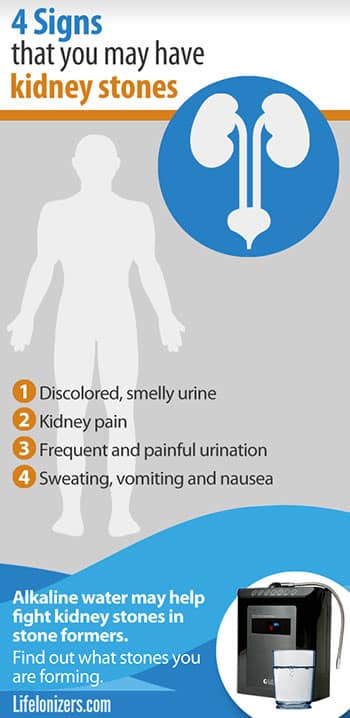Abdominal pain is the most common symptom of kidney stones, but it isn’t the only one. Renal Colic, the waves of pain

caused by kidney stones is also accompanied by changes in the color and odor of the urine along with flu-like symptoms. If you are in severe pain, see a doctor right away because severe abdominal pain can indicate a life-threatening condition. Keep in mind, kidney stones can pass on their own, but it isn’t worth taking chances. If you think you have kidney stones, you should see your doctor right away. Your doctor can lessen the discomfort and provide medicine to help you pass stones.
Discolored, smelly urine
A warning sign: Kidney stones result from excessively concentrated urine. If your urine is cloudy, dark, and has a strong odor on a regular basis, you may be at risk for forming stones. If stones have formed, blood may be visible in your urine. Keep in mind that kidney stones aren’t the only reason blood may enter your urine, it can be caused by kidney and bladder infections too.
Kidney pain
When stones get stuck in the kidneys, the pain is sudden and severe. The pain from kidney stones is among the worst known types of pain. Pain from stones being stuck in the kidneys may also be accompanied by back pain, pain in the genitals or groin. This pain may pass or move if the stones in the kidneys move. The pain caused by kidney stones comes in waves, this type of pain is called colic. In between acute pain episodes, there is usually a significant underlying ache.
First Aid: Non-steroidal anti-inflammatory drugs (NSAIDs) such as ibuprofen, acetaminophen (Tylenol) and aspirin offer the most effective over-the-counter pain relief for stones. Along with the pain medication, drink plenty of water. You should drink enough water to maintain light-colored urine, but there’s no need to overdo it. Small stones may pass on their own if you drink enough water, but there’s no evidence that chugging water would make a stone pass any faster. Proper hydration can help prevent stones from forming in the future, so resolve to keep yourself hydrated!
Additional pain relief can be provided by applying warmth to the affected area. Put a heating pad or a hot water bottle on the lower back where the most pain is felt.
Frequent and painful urination
Drinking more water to flush kidney stones out may sound like a simple thing to do, but it’s not. Along with the abdominal pain, kidney stones cause frequent and painful urination even if you don’t drink any fluids. So it’s important to remember, you don’t save yourself any pain by not drinking, and in fact you may prolong your pain because each time you urinate, you give your body a chance to pass the stones.
Sweating, Vomiting and Nausea
Flu like symptoms can accompany abdominal pain when you have kidney stones, and they may be a sign of an infection. If you have ongoing, flu-like symptoms in addition to the pain, seek medical attention promptly. An infection along with kidney stones is potentially life threatening.
Alkaline water may help fight kidney stones in stone formers
Kidney stones form when the concentration of substances like calcium, uric acid, or oxalate in the urine gets too high, or when the concentration of citrate in the urine gets too low. Drinking adequate amounts of water each day can help reduce your chances of forming stones by lowering the concentration of stone forming substances in your urine.
It’s important to know what kinds of stones you’re forming: Alkaline water raises urine pH, which can help prevent some stones from forming. If you have a history of stone-forming, talk to your doctor before starting alkaline water. Your doctor may want to strictly control your urine pH, and you should follow their instructions to the letter. Alkaline water also supplies calcium, and your doctor may want to limit your intake of calcium.
Alkaline water could be most helpful if you form calcium oxalate stones. These are stones that form because you have excessive levels of oxalate in your urine. The calcium in alkaline water will bind to the oxalate in your intestines, and that can lower oxalate levels in your urine.
The most important things to talk about with your doctor is that alkaline water raises urine pH, and that it supplies calcium. In most cases, alkaline water’s higher pH and the moderate amount of calcium it supplies will be helpful. There are some cases where doctors need to precisely control urine pH or calcium levels, so if you form stones, you need to talk to your doctor before drinking alkaline water.
Learn more about what alkaline water could do for you. Call us at 877-959-7977 for a free, no obligation consultation
References
Ostojic, Sergej, and Marko Stonanovic. “Hydrogen-Rich Water Affected Blood Alkalinity in Physically Active Men.” . Research in Sports Medicine: An International Journal, 06 Jan 2014. Web. 20 Feb 2014. <http://www.tandfonline.com/doi/full/10.1080/15438627.2013.852092>
Abraham, Guy, and Jorge Flebas. “The effect of daily consumption of 2 liters of
electrolyzed water for 2 months on body composition and several physiological parameters in four obese subjects: a preliminary report.” Highbeam Research. Original Internist, 01 Sep 2011. Web. 2 Jul 2013. <http://www.highbeam.com/doc/1G1-269433201.html>
Heil, D. “Acid-base balance and hydration status following consumption of mineral-based alkaline bottled water..” Journal of the International Society of Sports Nutrition. Journal of the International Society of Sports Nutrition, 13 Sep 2010. Web. 26 Mar 2014. <http://www.jissn.com/content/7/1/29>
Rosborg, I, B Nihlgard, and L Gerhardsson. “Hair element concentrations in females in one acid and one alkaline area in southern Sweden.” PubMed NCBI. Ambio, n.d. Web. 3 Jul 2013. <http://www.ncbi.nlm.nih.gov/pubmed/14703901>
Ong, Choon. “Minerals from drinking-water: Bioavailability for various world populations and health implications.” WHO | Water Sanitation Health. World Health Organization, 17 Aug 2004. Web. 4 Jul 2013. <http://www.who.int/water_sanitation_health/dwq/nutbioavailability/en/>.